The Kentucky Derby is one of the most iconic and prestigious sporting events in American history. Since 1875, the Run for the Roses has captured the nation’s imagination as the greatest two minutes in sports. In this comprehensive guide, we explore the rich history, traditions, and fascinating facts that have defined this legendary horse race for over 140 years.
The Origins of the Kentucky Derby (1875)
The Kentucky Derby traces its roots back to 1872, when Col. Meriwether Lewis Clark Jr. traveled to Europe and became enamored with the Epsom Derby in England. Inspired to bring a similar high-society racing event back home, Clark acquired land from his uncles John and Henry Churchill to build a racetrack. He named it Churchill Downs, and hosted the first Kentucky Derby on May 17, 1875.
The inaugural Derby attracted over 10,000 spectators who witnessed a field of 15 horses compete in the 1.5 mile race. A black jockey named Oliver Lewis rode the winner, Aristides, cementing the important role African-American jockeys played in the early years of the race.
Key Milestones
Over the decades, the Kentucky Derby continued to evolve into the world-famous spectacle it is today:
● 1894: A large grandstand was constructed to accommodate fans
● 1896: The race was shortened to 1.25 miles, and the winner received a floral wreath for the first time
● 1902: Jimmy Winkfield became the last African-American jockey to win the Derby
● 1925: New York writer Bill Corum coined the race’s famous nickname, the "Run for the Roses"
● 1932: The iconic red rose garland was first draped onto the winning horse
● 1949: The race aired on local TV for the first time
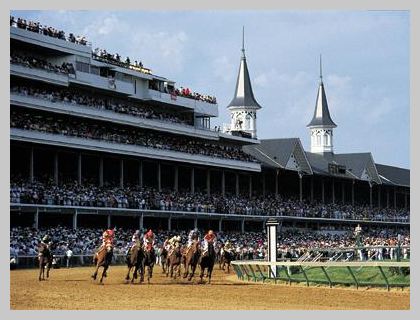
● 1970: Diane Crump became the first female jockey to ride in the Derby
● 2015: Record attendance was set with 170,513 spectators
Today, the Kentucky Derby continues to evolve. In 2018, the prize money increased to a record $2 million dollars. The 1st place purse of $1.24 million helped attract new owners and top thoroughbred talent. And in 2020, the COVID pandemic postponed the race until Labor Day weekend for the first time. But the Derby endured, even in the face of extraordinary circumstances.
The Fastest Two Minutes in Sports
Part of what makes the Kentucky Derby so exciting is that it packs all of the drama and intensity of a long distance race into just two minutes. The 1 1/4 mile race tests the speed, stamina and determination of the horses and jockeys. And throughout its history, a few thoroughbreds have set new records for completing the Derby in record time:
● 1973: The legendary Secretariat set a Derby record at 1:59.40 that still stands today. His powerful 31 length victory is considered one of sports’ all-time greatest achievements.
● 2001: Monarchos raced to a near-record time of 1:59.97, just narrowly missing Secretariat’s mark.
● 2020: Authentic clicked off the 3rd fastest time ever at 1:59.60
Winning the Derby requires a combination of factors – a gifted horse, a savvy jockey, smart race strategy, and of course, some luck. And completing this grueling course in under 2 minutes is a remarkable feat.
Tradition Meets Spectacle
Beyond the racing, the Kentucky Derby experience is defined by long-standing traditions juxtaposed with over-the-top spectacle. Mint Juleps, elaborate hats, and the playing of “My Old Kentucky Home” create a genteel, distinctly Southern backdrop. But the raucous infield party featuring nearly 100,000 rambunctious, often inebriated fans generates the festive chaos that the Derby has also become known for.
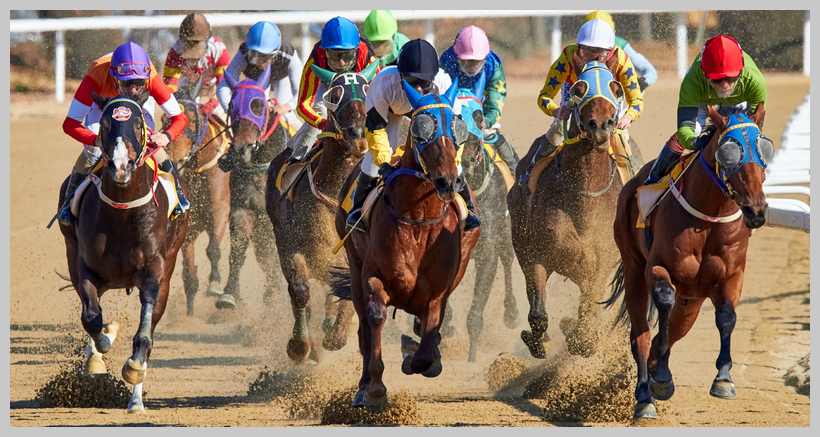
Additional traditions help make Derby Day special:
● The Garland of Roses: Since 1932, the winning horse has been draped with a lush floral garland with over 400 red roses sewn in. The 140 pound blanket symbolizes the struggle and sacrifice necessary to persevere.
● The Trophy: First awarded in 1924, the solid gold trophy depicts horses racing to reach the prized wreath of roses. The names of every winning horse, owner, trainer and jockey are etched into the base.
● The Song: Playing Stephen Foster’s 19th century ballad “My Old Kentucky Home” as the horses step onto the track stirs deep emotion and nostalgia before the big race.
● The Drink: The official cocktail of the Derby is the Mint Julep, a refreshing bourbon drink featuring sugar, water and plenty of muddled mint. Over 120,000 are consumed over the two-day race weekend.
Blending these time-honored traditions with the sheer spectacle of the event itself has created an unmatched, bucket-list sporting experience.
Derby Predictions and Betting
For racing aficionados and amateur gamblers alike, predicting the Kentucky Derby winner presents a thrilling challenge. Handicapping the field of 20 talented three-year olds tests even the most seasoned experts.
Several factors can provide clues on determining a likely champion:
● Pedigree: Horses bred from past Derby winners often inherit the speed, stamina and temperament to give them an edge.
● Prep Races: The Road to the Kentucky Derby prep races offer insights into which thoroughbreds are peaking at the right time.
● Post Position: The starting gate position impacts how the race unfolds. Statistically posts 1-5 generate the most winners.
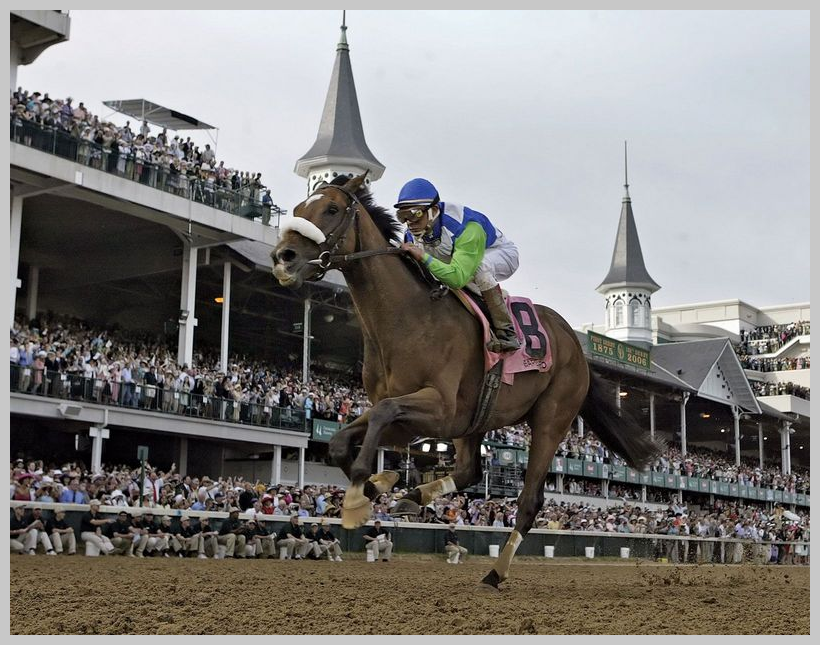
● Trainer: Top trainers like Bob Baffert and D. Wayne Lukas who have already visited the Winner’s Circle know how to have their horses primed for the big race.
Once the thorough analysis is complete, speculation gives way to cold hard betting. And the Derby offers a range of wagering options:
● Win/Place/Show: Bettors predict 1st, 2nd and 3rd place finishers in these straightforward bets.
● Exacta/Trifecta: Predicting the correct order of the top two or three horses offers a more difficult challenge – and the chance for a big payday for lucky prognosticators!
● Superfecta: Correctly picking the top four horses in order is extremely hard but can result in massive payouts.
The allures of both glory and gambling will forever be a central part of why the Kentucky Derby occupies such a mythical place in American culture.
Memorable Horses Over the Decades
The Kentucky Derby history books contain stories of gallant horses that overcame adversity or demonstrated awe-inspiring talent:
Secretariat (1973)
The chestnut colt many consider the greatest racehorse of the 20th century. His dominating Derby performance and 31 length margin of victory remain unmatched.
Seattle Slew (1977)
A wire-to-wire Derby winner who later secured the rare Triple Crown. His aggressive style electrified fans.
Genuine Risk (1980)
As the first filly (female horse) to win since 1915, she broke gender barriers with her determined effort.
Mine That Bird (2009)
This unheralded gelding (castrated male horse) pulled a monumental 50-1 upset with his dramatic come-from-behind victory charge.
California Chrome (2014)
His working class owners and unconventional training methods captured fans’ hearts. He nearly missed making history as the first Triple Crown winner in 36 years.
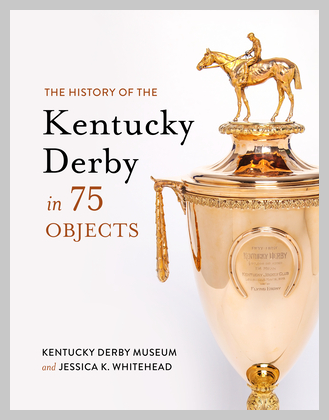
The Future of the Kentucky Derby
After over 140 years of memorable history, the Kentucky Derby appears well positioned to continue thriving into the future.
Several factors support its growth and longevity:
● Increased prize money, now at a record $3 million dollars, keeps attracting talented horses. Owners are investing more into breeding, training and technology to gain an edge.
● Prominent corporate sponsorships and TV rights fees provide greater exposure and help fund improvements at historic Churchill Downs.
● Novel concepts like “Derby City Gaming”, a new historical racing machine facility, appeal to younger audiences and generate revenue for operations.
● Health and safety reforms including doping tests for horses and concussion protocols for jockeys signify greater oversight that will help modernize and advance the sport.
The Greatest Two Minutes in Sports has already endured over a century’s worth of societal evolution. By preserving its special traditions while innovating for the future, the Kentucky Derby appears destined to continue as the pinnacle of American horse racing for generations to come.
Frequently Asked Questions
When is the Kentucky Derby?
The Kentucky Derby takes place annually on the first Saturday of May at Churchill Downs racetrack in Louisville, KY. The corresponding Kentucky Oaks for female horses occurs the day before on Friday. In 2023, the Derby will occur on May 6th.
How can I attend the Kentucky Derby?
Attending requires purchasing tickets in advance, as the event routinely sells out completely. Options range from luxury suites to general admission infield access. Demand significantly exceeds supply, so expect to pay a premium or enter a lottery for the opportunity to buy tickets.
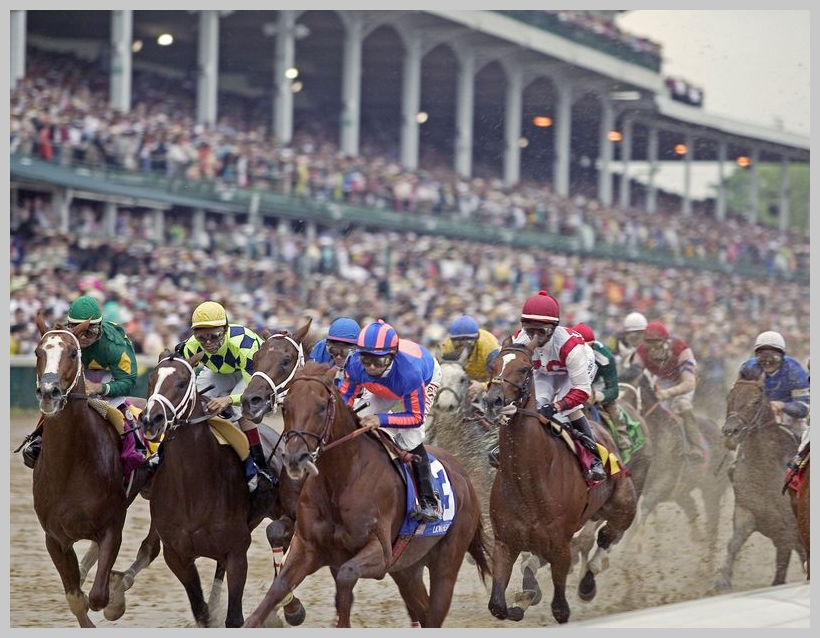
What are common Kentucky Derby traditions? Wearing creative hats, sipping Mint Juleps, singing "My Old Kentucky Home" and adorning the winning horse with a garland of roses highlight the time-honored traditions that make Derby Day special.
How much does the Kentucky Derby winner earn? The champion owner takes home a $1.86 million share of the $3 million total purse. The amounts earned makes winning one of the most lucrative prizes in all of horse racing.
How fast was Secretariat’s record Kentucky Derby time? The legendary Secretariat set a Derby record time of 1 minute, 59.40 seconds in 1973 that still stands today. His dominating, wire-to-wire victory by over 31 lengths is considered one of sports’ all-time greatest feats.